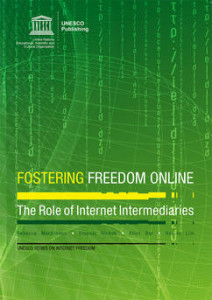 [UNESCO press release, Link] “Fostering Freedom Online: the Role of Internet Intermediaries” is the title of a new title in the UNESCO Internet freedom series. With the rise of Internet intermediaries that play a mediating role on the internet between authors of content and audiences, UNESCO took a joint initiative, with the Open Society Foundations, the Internet Society, and Center for Global Communication Studies at the University of Pennsylvania’s Annenberg School for Communication, to examine this recent historical phenomenon and how it impacts on freedom of expression and associated fundamental rights such as privacy.
[UNESCO press release, Link] “Fostering Freedom Online: the Role of Internet Intermediaries” is the title of a new title in the UNESCO Internet freedom series. With the rise of Internet intermediaries that play a mediating role on the internet between authors of content and audiences, UNESCO took a joint initiative, with the Open Society Foundations, the Internet Society, and Center for Global Communication Studies at the University of Pennsylvania’s Annenberg School for Communication, to examine this recent historical phenomenon and how it impacts on freedom of expression and associated fundamental rights such as privacy.
The case study research, collaboratively delivered by 16 international researchers led by Ms Rebecca MacKinnon and Mr Allon Bar, as well as 14 members of International Advisory Committee, covers of three categories of intermediaries:
- Internet Service Providers (fixed line and mobile) such as Vodafone (UK, Germany, Egypt), Vivo/Telefônica Brasil (Brazil), Bharti Airtel (India, Kenya), Safaricom (Kenya),
- Search Engines such as Google (USA, EU, India, China, Russia), Baidu (China), Yandex (Russia) and
- Social Networking Platforms such as Facebook (USA, Germany, India, Brazil, Egypt), Twitter (USA, Kenya), Weibo (China), iWiW (Hungary).
The research showed that internet intermediaries are heavily influenced by the legal and policy environments of states, but they do have leeway over many areas of policy and practice affecting online expression and privacy. The findings also highlighted the challenge where many state policies, laws, and regulations are – to varying degrees – poorly aligned with the duty to promote and protect intermediaries’ respect for freedom of expression. It is a resource which enables the assessment of Internet intermediaries’ decisions on freedom of expression, by ensuring that any limitations are consistent with international standards. The research also recommends specific ways that intermediaries and states can improve respect for internet users’ right to freedom of expression. This is through promoting:
- adequate legal frameworks and policies consistent with international norms,
- multi-stakeholder policy development,
- transparency of governance,
- accountability in self-regulation,
- mechanisms for remedy, and
- public information and education.
UNESCO has succeeded in raising awareness and promoting good practice through past research in the UNESCO Series on Internet Freedom: Freedom of connection, freedom of expression: the changing legal and regulatory ecology shaping the Internet (2011) and Global survey on Internet Privacy and Freedom of Expression (2012).
This rich material in this, the third in UNESCO Series on Internet Freedom, will be of great value to all stakeholders. These are industry actors, UNESCO Member States, technical community, Intergovernmental organizations, private sector, civil society, and others both national and international.
This research is linked to UNESCO draft conceptual framework of “Internet universality” which draws from UNESCO decisions on the Internet, and recognises that four core principles should inform cyber actors. These principles are that the Internet should be human rights-based, open, accessible for all and governed by multi-stakeholder participation.
The research also helps to inform UNESCO’s implementation of a comprehensive and consultative multi-stakeholder Internet study as mandated by the Organization’s 37th General Conference Resolution 52. The study, due in 2015, covers UNESCO’s key competence areas of access to information and knowledge, freedom of expression, privacy, and ethical dimensions of the information society, and contains possible options for future actions.
The research has been presented at a number of international events including the 9th Internet Governance Forum and the 4th UN Forum on Business and Human rights. The publication will initially be launched at UNESCO’s forthcoming Internet conference “Connecting the Dots: Options for Future Action” (3-4 March 2015).




